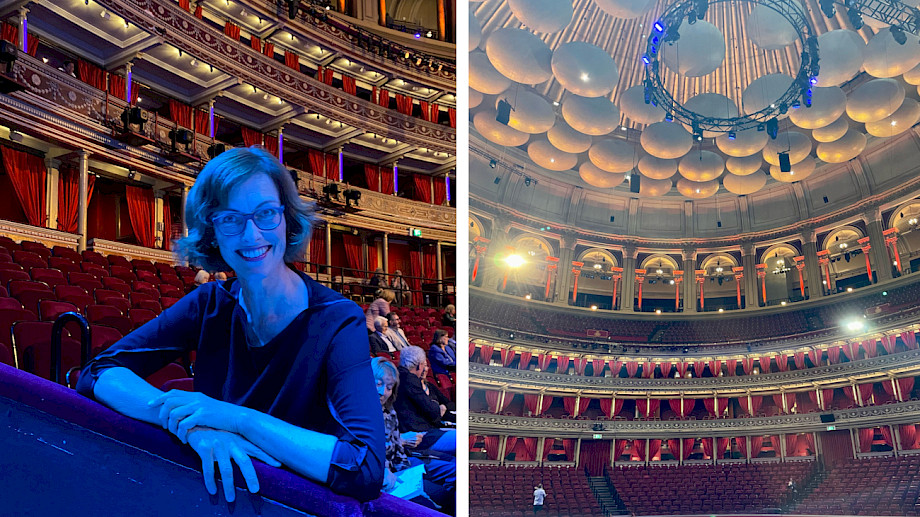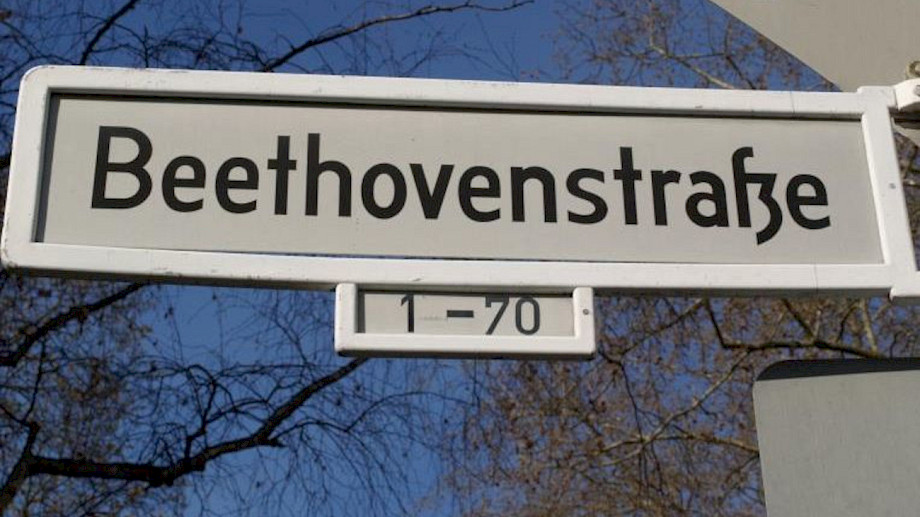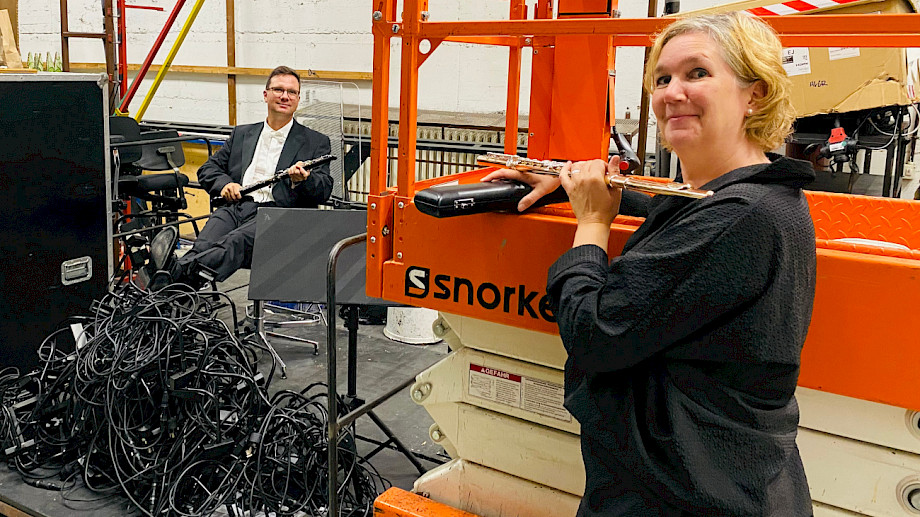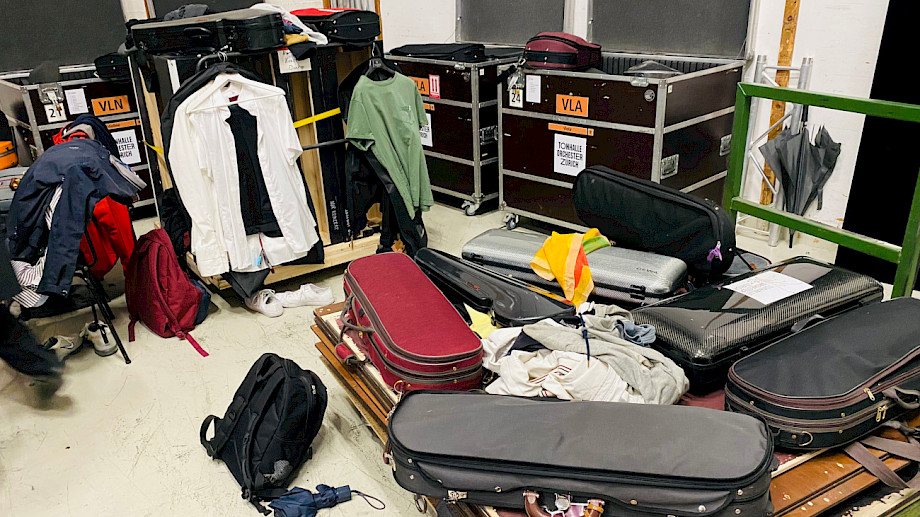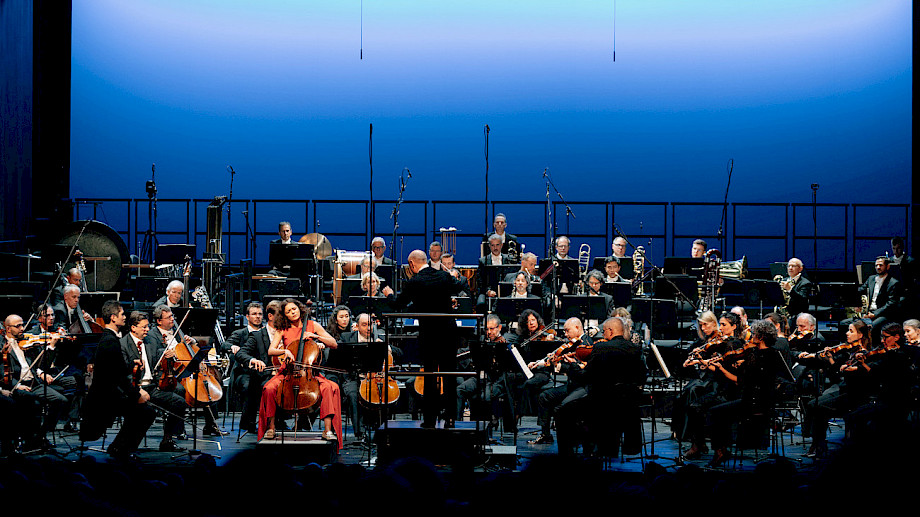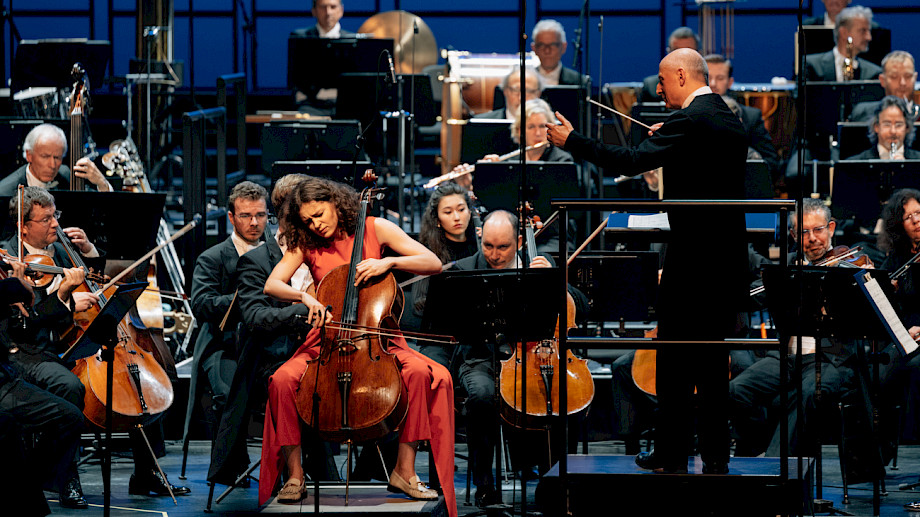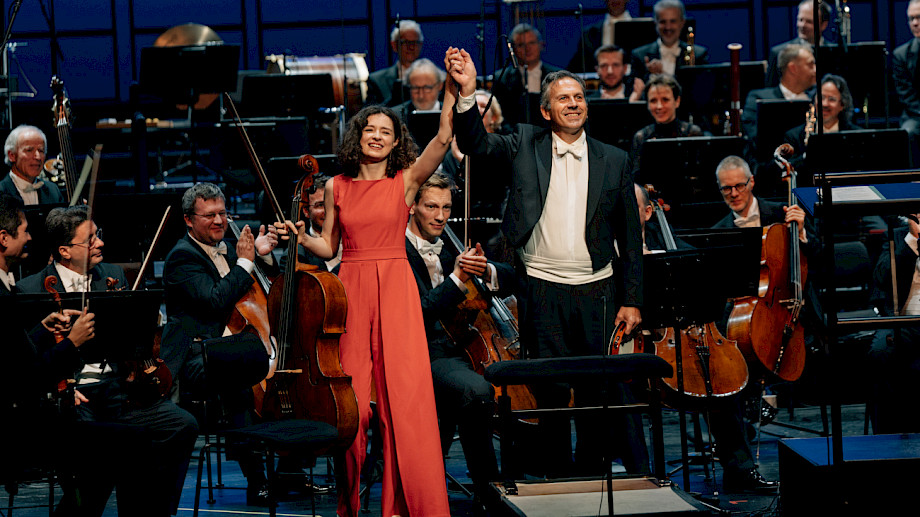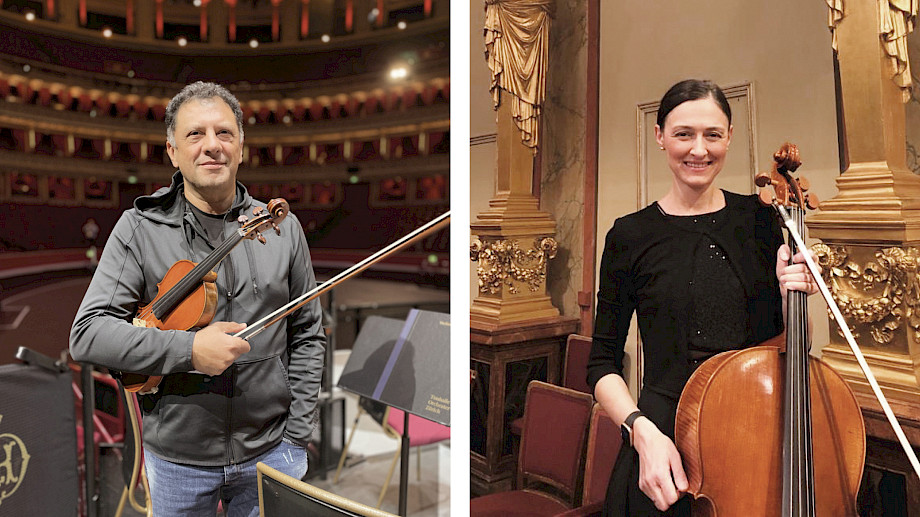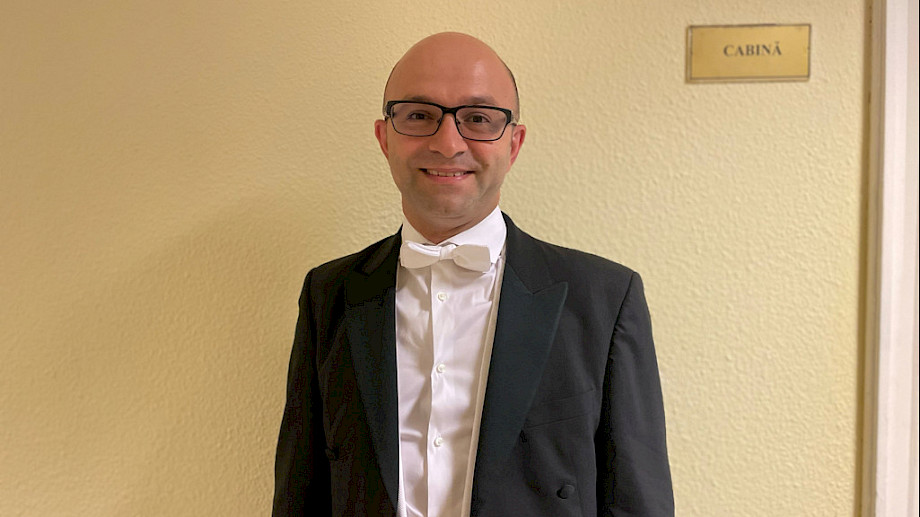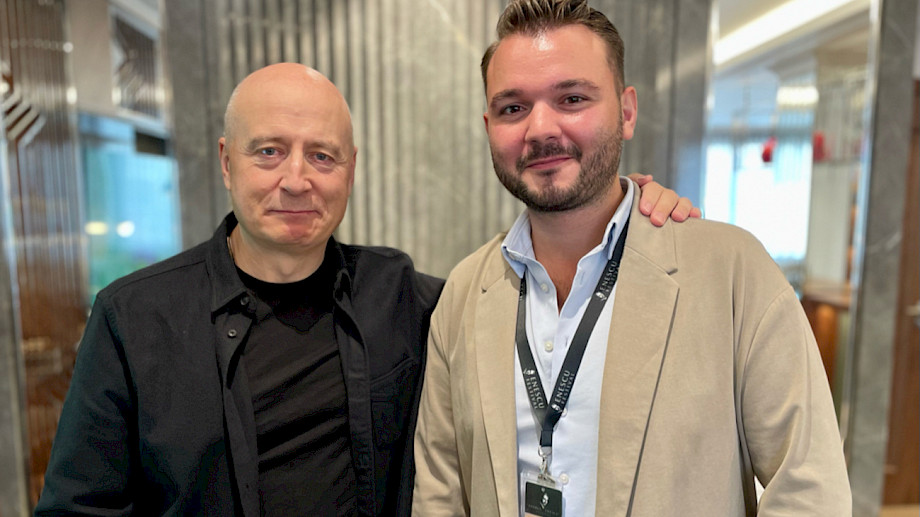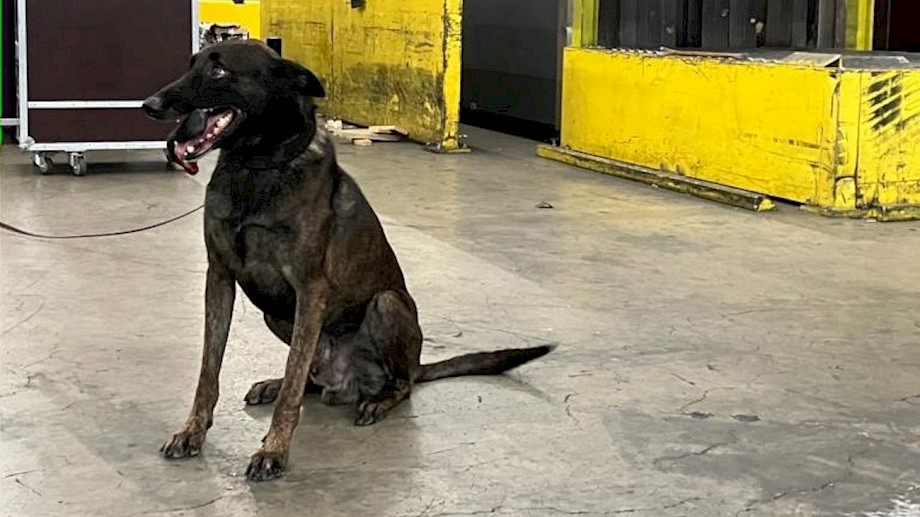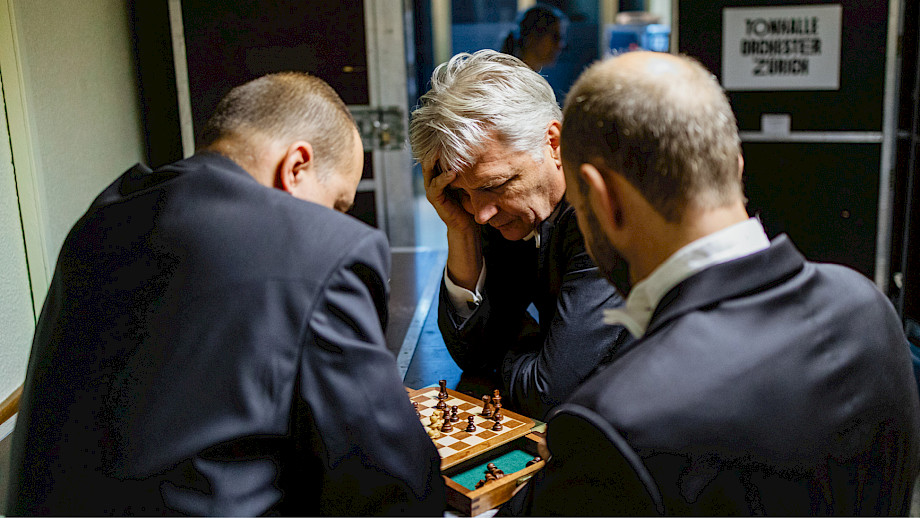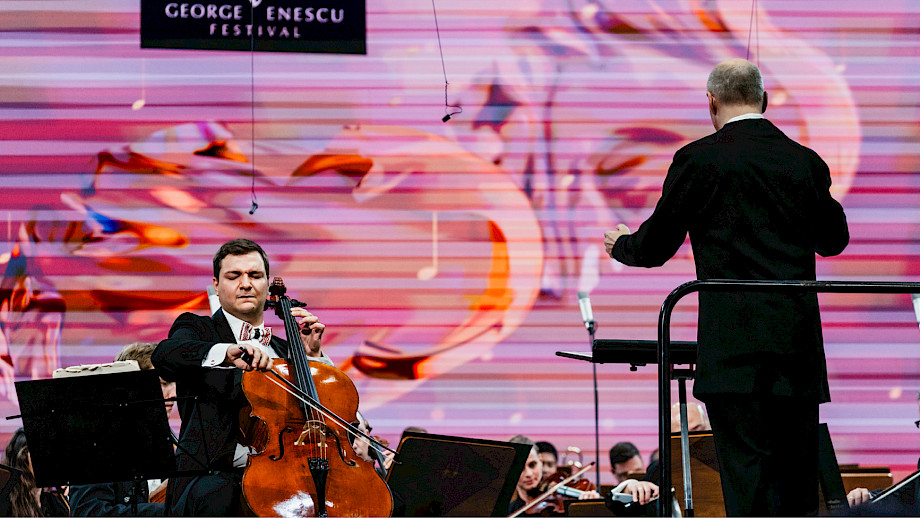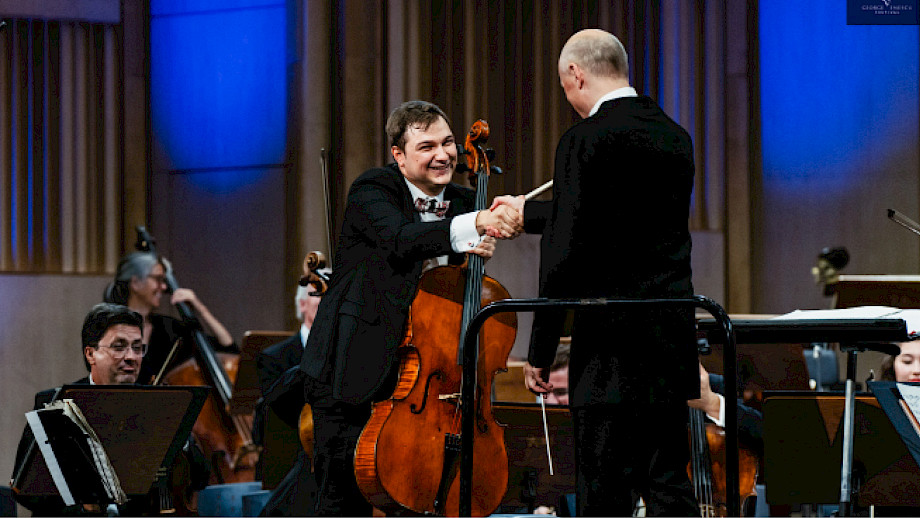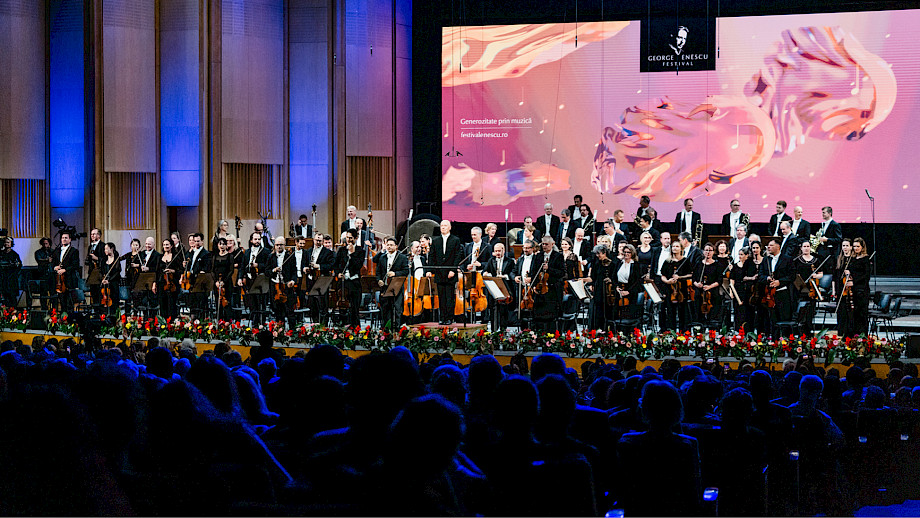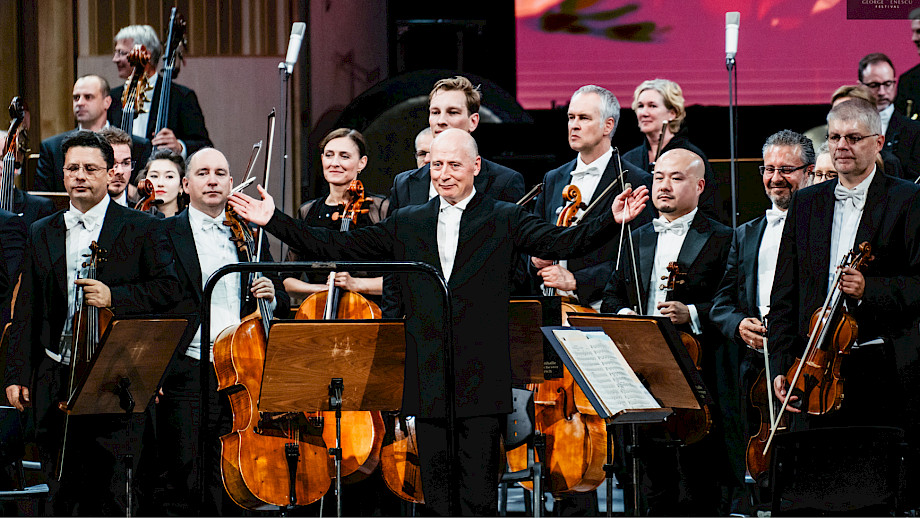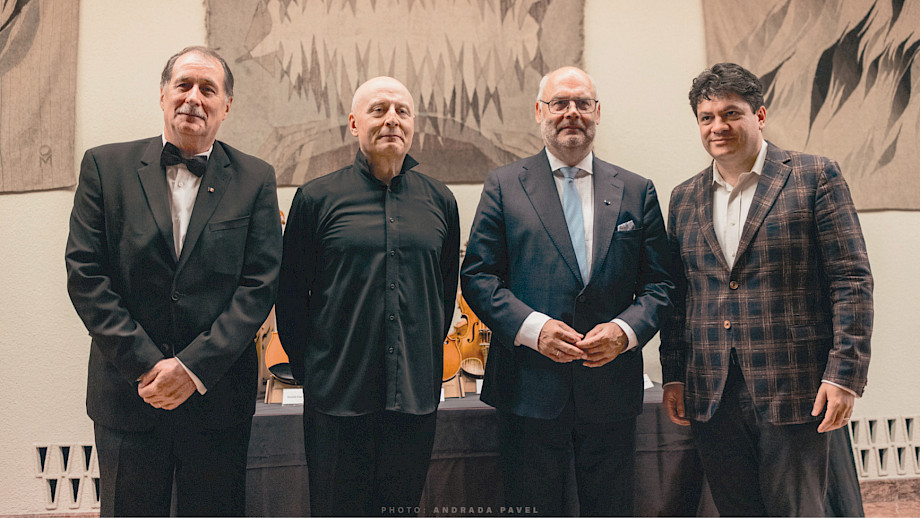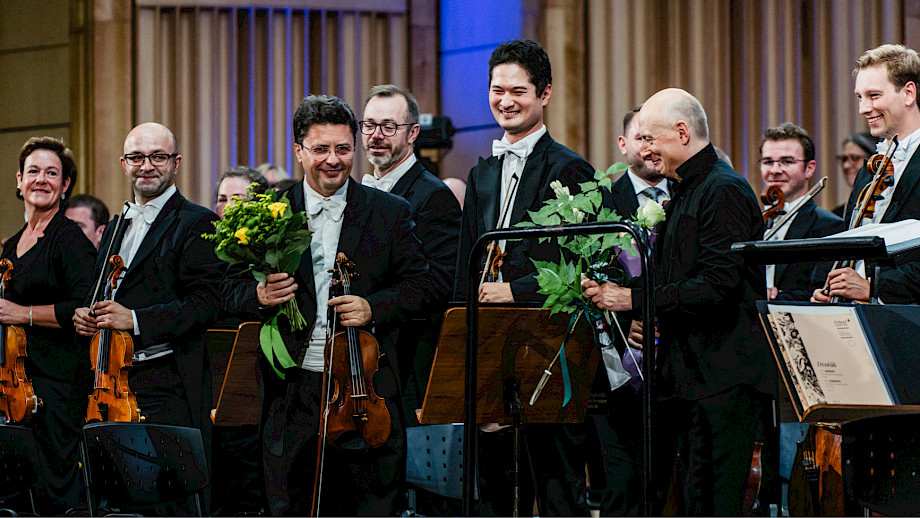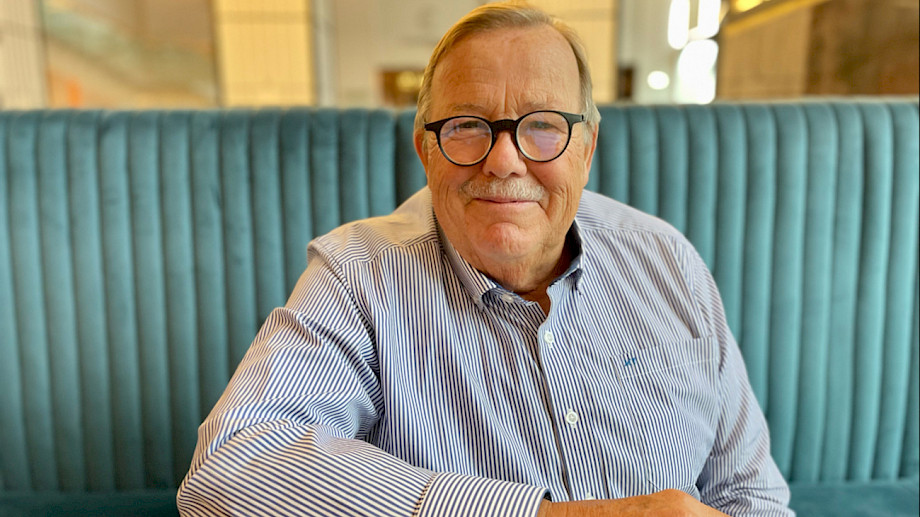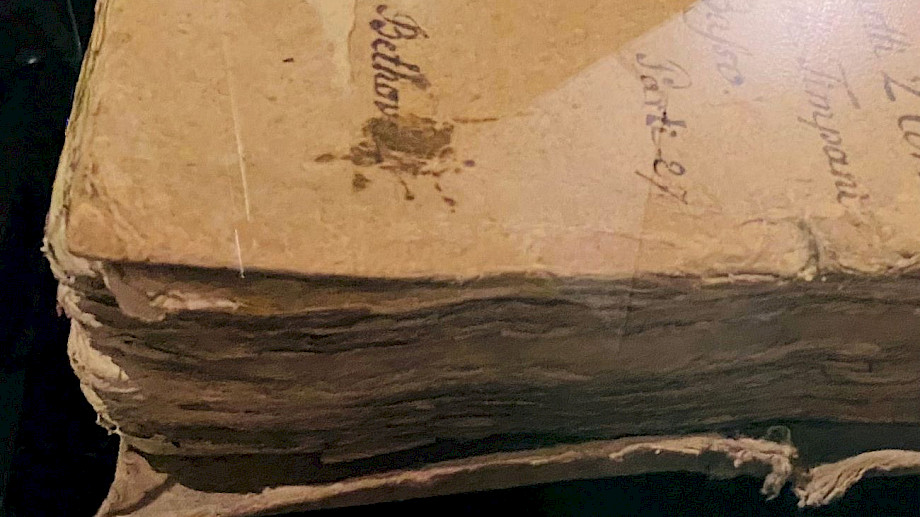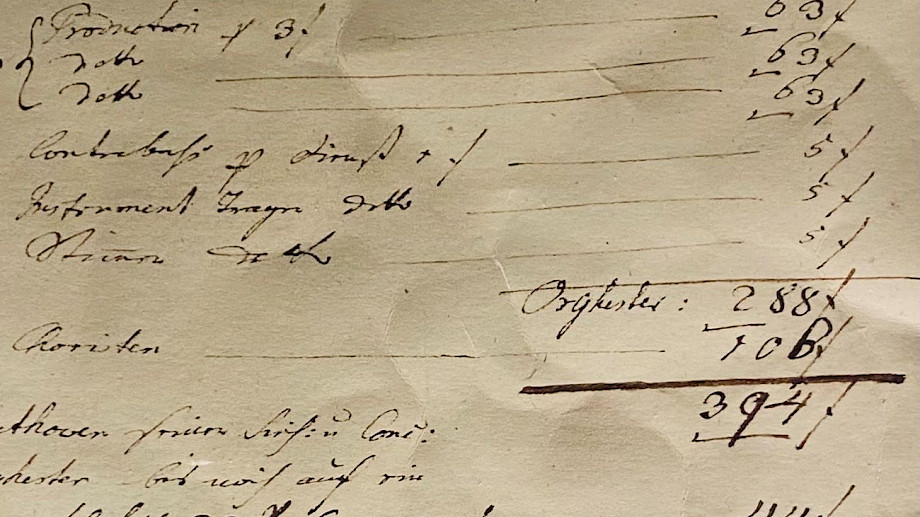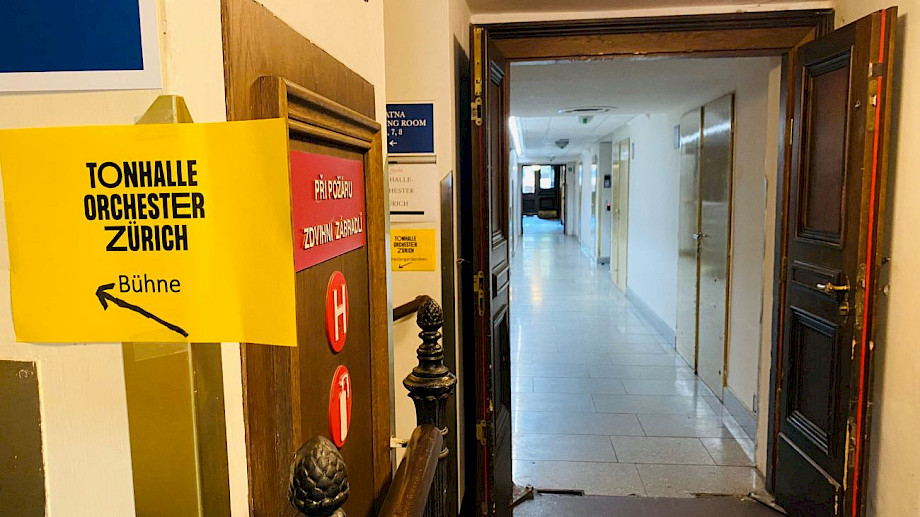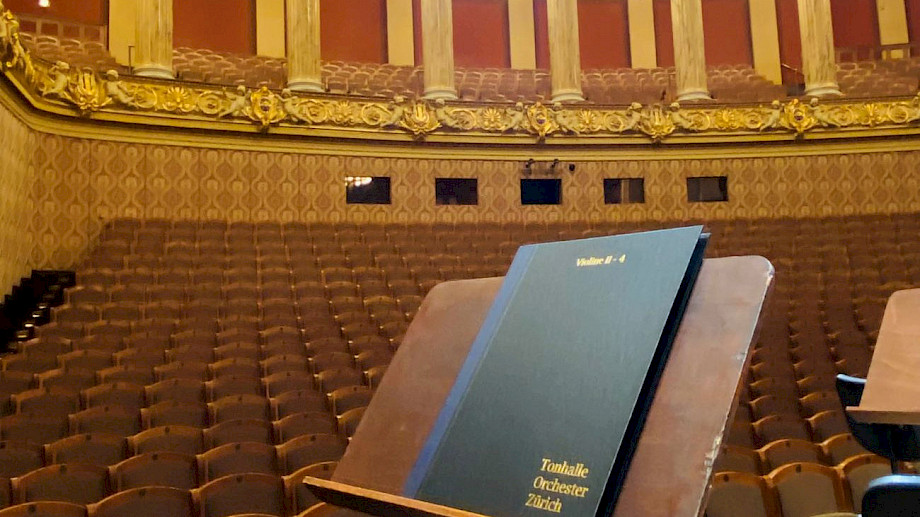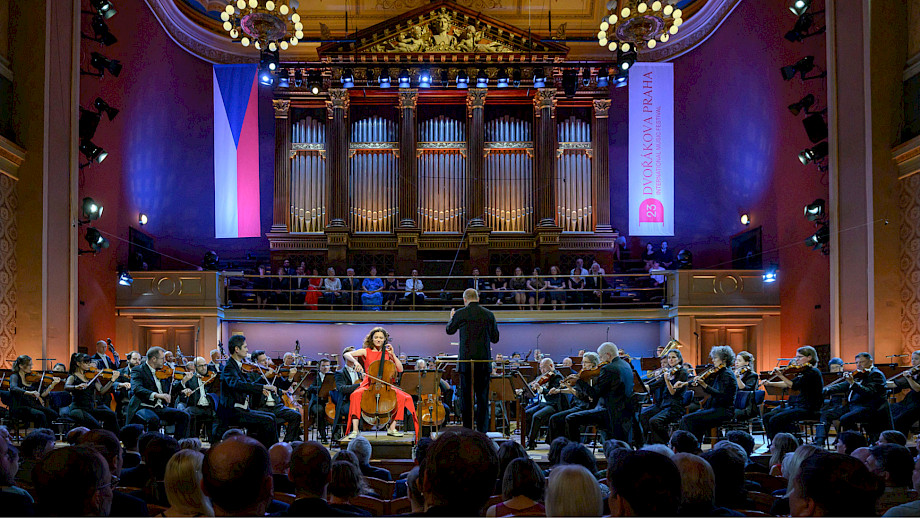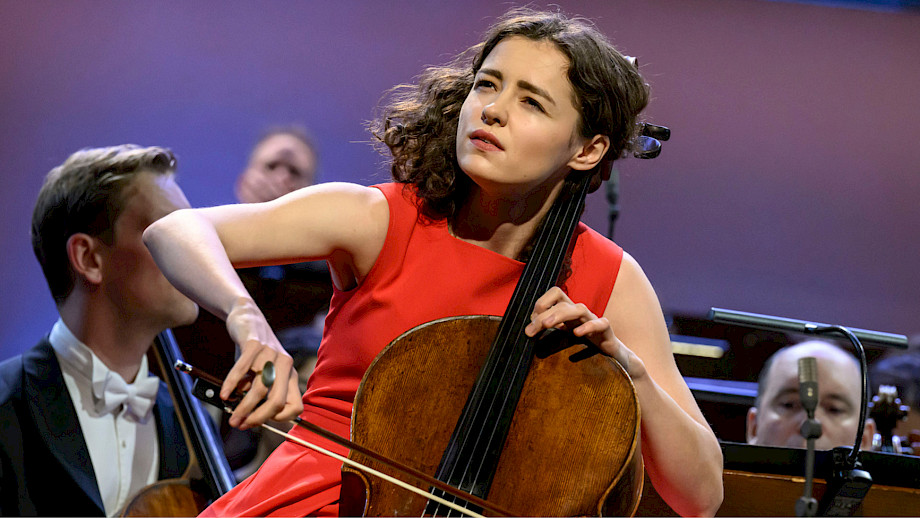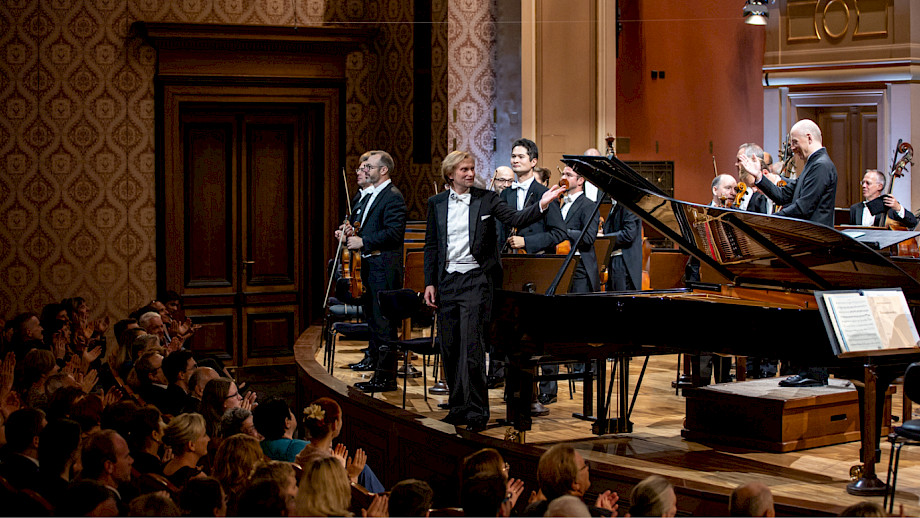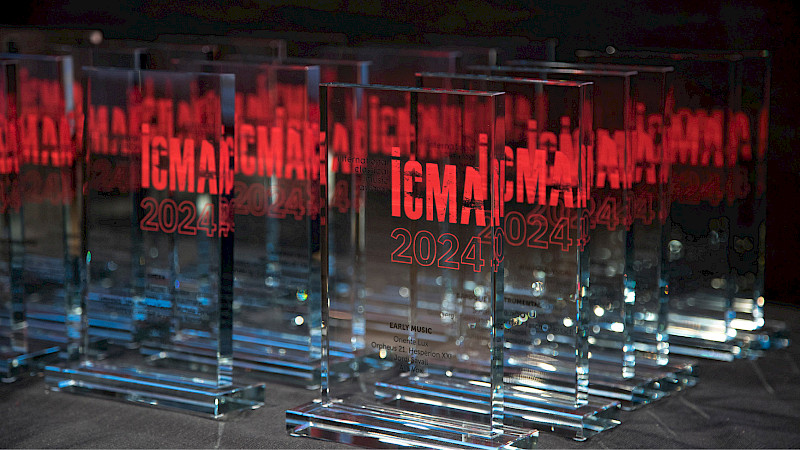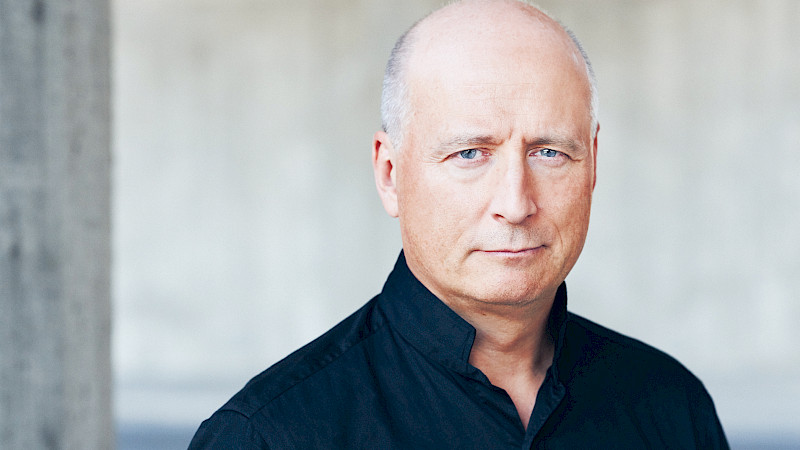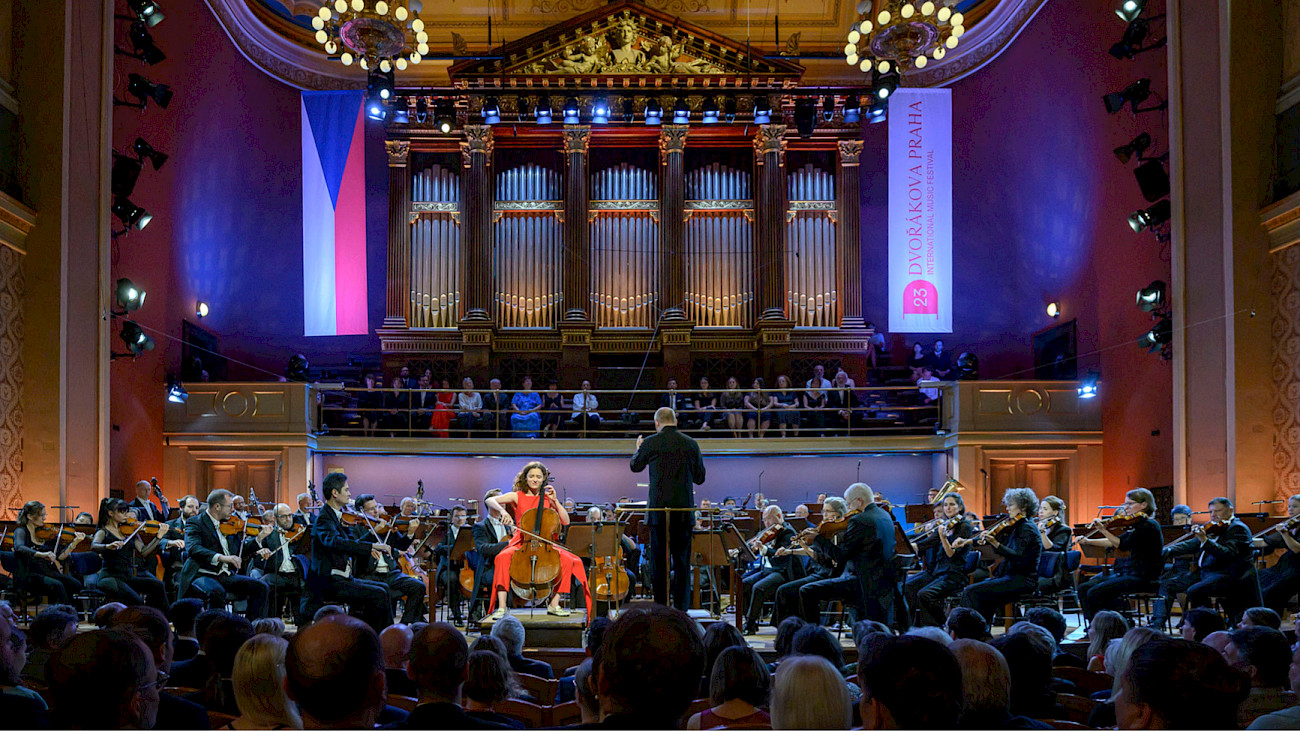
The Tonhalle Orchestra Zurich on tour in Europe
From 30 August to 8 September 2023, the orchestra toured together with Paavo Järvi.
Four renowned festivals were on the tour schedule: the BBC Proms, the Beethovenfest in Bonn, the George Enescu Festival in Bucharest and the Dvořák Prague International Music Festival.
In this tour blog we tell you what we experienced in the concerts and otherwise:
Tour blog
Wednesday, 30 August
First stop: London, Royal Albert Hall, BBC Proms. But what are these Proms? The answer is provided in our first blog post by Michaela Braun.
"Come as you are" – the BBC Proms
Would you like to lie in concert? Then let's go to the BBC Proms in London! Here, people are not so fussy about "seeing and being seen". You dress informally, because the idea when it was founded in 1895 was to enable as many people as possible to enjoy "serious music". At that time, the concerts lasted over three hours.
Making music accessible is still the main focus today. This access is mainly used by the "Prommers" – the Promenade visitors, because that is what the abbreviation Proms (Promenade Concerts) stands for. 2,500 standing or reclining seats are available in the Arena and the Gallery (with a total of 8,400 seats) for 8 pounds; they usually go on sale online one day before the concerts. If you don't get a ticket then, for example, you can listen to our concert live on BBC Radio 3 at 7.30pm (BST). Everything has been broadcast live or recorded here since the BBC took over in 1927. An archive that is a pleasure to browse through.
We are in good company in the "classical for starters" series – as Prom No. 59 of this year's edition. However, we ourselves are not "starters" or newcomers. The orchestra is making its sixth guest appearance at the Proms (2003, 2005, 2009, 2011, 2014, 2023), Paavo Järvi's tenth – an anniversary, in other words.
From the Queen's Hall to the Royal Albert Hall
In 1939, shortly after the start of the war, the BBC could no longer support the Proms at the Queen's Hall. Henry Wood, one of the founders of the Proms and its first conductor, found enough sponsors for 1940 and 1941. In 1941, the Queen's Hall was destroyed by a bombing raid, and the only alternative was the Royal Albert Hall, opened in 1871. The BBC then took over the patronage again in 1942. Since its inception, the festival has been held every year. Even in 2020, during the pandemic – reduced to 14 concerts in front of an empty hall.
In the 1950s, various English orchestras took part in the Proms for the first time (before that, it was the BBC Orchestra and the London Symphony Orchestra), and from the 1960s onwards, international orchestras also took part.
Stories were written here
The history of the festival is long and varied. Much can be said about the hundreds of concerts. Two were particularly memorable.
On 21 August 1968, the Russian cellist Mstislav Rostropovich played Dvořák's Cello Concerto – the night before the Soviet Union had invaded Czechoslovakia. This evening had been planned for months, but now it was caught up with current events. Heckling in the audience began as the State Symphony Orchestra of the Soviet Union was already taking the stage. "Go home!" someone shouted, or "Russians out!". The choice of the Cello Concerto seemed like an insult to the audience that evening. Rostropovich's playing was emotional, full of anger and sadness about what had happened in Prague (the city where he met his wife). It is said that he cried while playing, and he later recalled that he imagined the people who had been killed. At the end, he held up the score in a gesture of solidarity. Still, the audience could not be converted.
Also at the Proms in 1912, there was a remarkable premiere – that of Arnold Schoenberg's 5 orchestral pieces. The audience was warned in advance that the works would be somewhat difficult to listen to. But this was of little use, for the Daily Mail wrote after the concert: "The futuristic music was received with decently suppressed laughter"; a feeble attempt at applause elicited an indignant hiss. It was the first time a work had been met with such a response. What was so wrong with it? The music critics commented: Nothing. The music was "simply too complicated for the average person to grasp", said The Times; it was "like a poem in Tibetan: not a soul in the room could have understood it on first hearing". The Telegraph wrote: "Arnold Schoenberg is clearly ahead of his time", adding that this was not an insult; most readers' parents would have said the same about Wagner.
Almost 130 years after their foundation, the BBC Proms are still a guarantor that the musical range will be made accessible to a large audience at the highest level. The "Prommers" in the arena are the central element, and the informal atmosphere is probably something many concert halls around the world wish they had as well. Today, Wednesday, the orchestra and Paavo Järvi perform here: We will report how they fared.
Thursday, 31. August
The first concert of the tour at the sold-out BBC Proms is over. Violist Ursula Sarnthein tells us what it was like on and off stage.
There is nothing like the Proms
Performing at the BBC Proms is unique for me. Every Prom concert I have experienced is a highlight in my memory, from my first Prom in 1997 with the Gustav Mahler Youth Orchestra under Pierre Boulez to the last one in 2014 with David Zinman.
Why? First of all, there is this enormous hall. Nowhere else do we play in front of such an audience, more than 5000 people listening. The view from the stage up into the tiers is breathtaking. Amazing that they can see something from up there. And hear ... But it's not just the hall, it's also the unique atmosphere in the audience. But let's start with breakfast.
Breakfast talk
This morning at breakfast in the hotel, I happen to be sitting at the table with Martin Frutiger, our English horn player. I ask him what it's like for him to play the famous solo from the 9th Dvořák here. Not much different than elsewhere, he says. It's an exciting thing everywhere: he tells me that the right double reed is the key to success for him. He has many, many in his bag – now he has to see which one suits the climatic and tonal conditions of the Royal Albert Hall best. He hopes to be able to try out the solo in the audition, because only together with the accompanying orchestra will he know whether it really sounds as he imagines. "It is always a fantastic moment when the orchestra conjures up its carpet of sound at the beginning of the second movement and I can lay my sound and this beautiful melody on it. When I practise the solo alone, it sometimes feels 'difficult' but on stage it's always blown away, and magical every time."
Also at the breakfast table are the orchestra technicians (OT) Friedemann Dürrschnabel and Matthias Lehmann. For them, it is challenging that the stage is so big – almost a luxury problem, usually there is rather too little space ...
At the Royal Albert Hall, our OTs are always well looked after, there is always a member of staff at their side to help them manage their elaborate task with as little stress as possible: moving all the instrument containers to the right backstage rooms, setting up chairs, music stands and sheet music, bringing the big instruments onto the stage.
The OT day starts at least two hours before our rehearsal, and ends long after the concert. Only when the last container is back in the truck can they also toast to the successful concert. (Read more in the interview)
Bull's Run
Shortly before 3 p.m. I walk with a few colleagues up the generous staircase with the beautiful name "Queen Elizabeth II Diamond Jubilee Steps" to the imposing Albert Hall, enter through door 11, where we get our personal access badges at the artist entrance – even with a photo!
Find container, get instrument, find stage entrance and go to the stage. Normal tour procedure as far as it goes. The walk from the backstage to the podium also has a name, it's short and to the point: "Bull's Run".
My gaze first goes through the hall, up into the tiers – simply stunning! – before turning to the music stand, where a few hairy passages still have to be fingered...
The rehearsal is extensive, we have two hours to get used to the acoustics. Beethoven's Overture "The Consecration of the House" begins with two single, loud chords, with a long pause in between. We blast the first chord into the hall – immediately it flies around our ears as an echo. On the other hand, you don't feel much ambient sound because the hall is so big – almost as if you were playing outdoors. It helps to strive for a particularly warm sound when playing.
After the rehearsal, we soak up the last rays of sun in front of the Royal Albert Hall and watch the "prommers" in their long queue – these are the audience members in the standing room seats in the arena below and in the gallery above, who get a very cheap ticket this way on the concert day itself.
Three times magic
7.28 p.m. "Members of the Tonhalle Orchestra – this is your two-minute cue. Please come to the stage." sounds from the loudspeaker. Prom 59 begins, and magic happens three times. We do magic, highly concentrated, playing together as if it were chamber music, all antennas extended. Paavo does magic too – as so often, there are musical surprises, which we absorb wide awake and realise with joy. And another one works magic: Augustin Hadelich plays Tchaikovsky's violin concerto with truthfulness, deep expression and playful ease.
After Tchaikovsky, we hear the rhythmic stomping from the arena for the first time: an encore is demanded and Augustin Hadelich plays bluegrass! Audience and orchestra go into the break in a bomb mood.
Afterwards the Symphony from the New World – Martin's English horn solo a dream, and we let ourselves be carried away by the familiar piece. At the quiet parts, I am amazed at how quietly and spellbound the 5,000 people in the hall listen, until they break into loud cheering and stamping again during the applause. During the applause, the cellist next to me says, "It's a really great job we have." The audience gets its encore, a rousing, virtuoso Scandinavian piece by Hugo Alfvén – the audience has no idea that the first violins are sweating quite a bit during this, because it is so fast and virtuosic to play. They also succeed – and Prom 59 is history.
PS: After the concert to the pub – a must. In good company, with colleagues, English friends – and also here at the table with newly met Prom listeners – we toasted to everything that made this evening so special.
Friday, 1. September
In the meantime, the orchestra has travelled on to Bonn. It will play two concerts at the Beethovenfest. Michaela Braun has already had a look around and asked around.
Once Beethoven, always Beethoven
25 days, 70 concerts, 33 venues, 20,000 of 27,000 tickets already sold: The Beethovenfest in Bonn is a major festival, and today we have the honour of opening it. «Music about life» is the theme of this edition. The sustainability of our way of life is at the centre. How exactly may we understand this, I ask the artistic director Steven Walter.
«As the Beethovenfest, we want to take up topics that have relevance for all people,» says Walter. «The topic of sustainability is therefore an obvious one – in times of climate crisis, climate protests and weather phenomena. We are interested in how music addresses the topic, how it deals with the 'Life' life'. Beethoven, for example, expressed his experience of nature very vividly in works like the 'Pastoral' to music. But we also want to know what goes beyond life, what awaits us in the future, what comes after death (because no life without death). Our motto 'Music about life' is intended to illustrate the complexity of this life, our life, and is at the same time the basis on which we question artists, composers and visitors in over 70 concerts and enter into an exchange with them.»
The Beethovenfest was founded in 1845 by Franz Liszt, who must have been worried that Beethoven's legacy would be forgotten, that the myth of Beethoven, whose funeral in 1827 attracted some 20,000 people, would fade – as it did for many composers. The festival in Beethoven's birthplace Bonn was intended to celebrate his life and work. It is thus one of the oldest classical music festivals in Germany.
From 1949 to 1990, Bonn was the capital of West Germany, the centre of the country. In the meantime, politics plays out in Berlin, but the cultural focus and thus the focus on Beethoven has remained. And not only in Bonn: there are numerous Beethoven streets and squares all over the world (even the Tonhalle Zürich borders on a Beethovenstrasse), and an incalculable number of recordings; anyone who wants to romp around on Google will get 115 million results for the term «Beethoven». The German National Library has some 40'000 titles of books and essays on him. On Youtube, you can spend days watching videos about him; there are around 3.7 million available. Amazon offers more than 30'000 different CDs and records as well as more than 10'000 Beethoven-related books. The agony of choice ...
Liszt's concern was therefore unfounded. And we are delighted to be playing here in Bonn today and tomorrow!
Saturday, 2. September
What happened between London and Bonn? And how was the opening concert of the Beethovenfest for the orchestra? Violist Ursula Sarnthein has a few things to say about that.
Travel is risk
Thursday: London → Bonn. At such a large airport as Heathrow, it can happen that two symphony orchestras are waiting for their flight at the same time! Antonia Siegers-Reid enthusiastically identified the London Philharmonic Orchestra, her former orchestra, and was delighted at the unexpected reunion with old friends.
The LPO had been at the airport since 6.30 a.m. and were on their way to Wiesbaden. They were to play a concert there that same evening. Their flight had been cancelled, it was now already 2 p.m. and thus unlikely that they would make it to Wiesbaden in time for the concert – an absolute nightmare on a tour, for the orchestra and also the organisers!
Fortunately, our plane took off on time for Bonn.
Bönnsch
Bonn, like my birthplace Düren, is in the Rhineland. The dialect spoken in Bonn is called Bönnsch, similar to Kölsch and sounds very homely to my ears. The orchestra technician Uli Acolas is also "from here", and so we give some colleagues on the bus a taste of how one "schprischt" here: the best example word is aircraft carrier – the Rhinelander says "Fluchzeuschträjer" – notice the three different ways of pronouncing the G ...
By the way – Beethoven also spoke like us!
And the LPO?
They didn't reach their hotel in Wiesbaden until 10 p.m. – the concert had to be cancelled.
Frankenstein and coloured doors
In Bonn we play at the opera – here it is much more complicated than before to find everything. There are hardly any signposts, but seemingly endless corridors and coloured doors. The way from the clothes containers to the ladies' dressing room, which is interestingly labelled "Frankenstein – Ladies' Ensemble", is so long that you get lost x times on the way. Sometimes we meet a nice young man from the Beethoven Festival who is there to show us the way. But he can't be everywhere at once!
In an opera house like this, there's a lot of stuff standing around backstage, and now there are also our countless containers. To unpack the instrument cases, we arrange ourselves with the space we find: for example, on a lift or even on mobile platforms standing around. For some unknown reason, someone moved the pedestal on which a viola case was lying, so that its owner was desperately looking for the new location of her viola shortly before the concert ...
We always take such situations with humour – it was quite funny backstage tonight. Below is a small visual impression.
And the concert?
It was streamed live on Youtube and is still available under this link. Listen and have a look!
I found the encore particularly remarkable, which Anastasia Kobekina played after Dvořák's Cello Concerto together with our percussionist Klaus Schwärzler on the tambourine!
Sunday, 3 September
In the meantime, the orchestra has arrived in Romania. For Josef Gaszi and Ioana Geangalau-Donoukaras this means: they are home. Michaela Braun spoke with them.
Heidi led the way
It was supposed to be a normal tour in 1995, but it turned out to be the normal madness. Musician meets law student who is a choir singer in her spare time, sees her in concert in the choir, wants to marry her - immediately. After a few letters and a visit to his home country, it was clear to violinist Josef Gaszi that this woman from Bern would become his wife, and instead of moving to the USA as planned, he moved to Bern. He was familiar with the film "Heidi" from his childhood days, and even then he told his mother, "I want to live there someday. The Bernese family was a little surprised at his daughter's choice, but she was convinced after three months in Transylvania, where she learned Hungarian, that he was the right one too. He was able to convince the family-in-law with his charm during the return visit.
He had already learned German at school, but Berndütsch was a different matter. At some point Zurich came into play, the violinist studied at the conservatoire, graduated with a concert diploma and performed with the Konsi Orchestra at the Tonhalle. To play here permanently was his dream. It became reality.
Now he is coming back on tour to his homeland, of which he naturally misses a lot - not least the soup culture of Romania. That is unattainable for him abroad. He also likes to come home otherwise, with his twins, who love the country, and of course with his wife. The family language is Hungarian. Josef Gazsi regrets that many years after the end of the dictatorship, Romania cannot live bilingualism, as is so beautifully the case in Switzerland. Too many tensions are the order of the day here.
When we performed in the concert hall in Bucharest two years ago, the dictatorship was suddenly very present to him again. The hall was the dictator's stage, suddenly he was sitting on this stage; and when you had to listen to these tirades when you were young, you don't just put it away. It was a negative goosebump moment, he says. It all still sits very deep. All the more so because no one talked about politics back then; it would have been far too dangerous to speak out.
Home
She misses cabbage rolls with meat every now and then, says our cellist Ioana Geangalau-Donoukaras. She has yet to find a restaurant in Zurich that makes as good as the one at home. Home and native country for her is still Romania - but in the meantime, of course, also Switzerland. At the age of 23, she left and wanted to leave. Financially, it was hardly feasible as a musician. Today she lives with her husband and children (with whom she speaks Romanian) in the greater Zurich area. Two or three times a year she travels to Romania - she stays there for a good two weeks to satisfy an understandable longing. She misses the language, but also the mentality. But she made the decision out of conviction. She left happy and always comes back happy. Her hometown is 160 km north of Bucharest, half a million inhabitants, a similar size to Zurich. Some friends come to visit her, but it is always a question of cost; many have also left, she says. Her parents also came regularly, but they are getting older. Ioana Geangalau-Donoukaras is looking forward to seeing them these days, also that they will be able to come to the concert, hear the orchestra and see where she can happily go about her work.
Sunday, 3. September
Cosmin Banica, our 2nd concertmaster, also grew up in Romania. Michaela Braun spoke with him.
Accept or leave?
He actually studied in Cologne, says our 2nd concertmaster Cosmin Banica, but always with the aim of returning home, not staying in Germany. He loves Romania. And he is happy that we are guests here at the festival in Bucharest. A wonderful country, actually. But only really. When he actually started as a concertmaster in a Romanian orchestra after his studies, the mentality in the field of orchestra management soon became an issue. If you didn't do what was decided – often at very short notice – you lost your job. Accept or leave, he said to himself at the time. The decision was bitter, but he would have had to make too many compromises. In 2008, he left and won the audition with us as 2nd concertmaster.
Before he became a father, he was in Bucharest six or seven times a year, mainly to see his friends. Friendships made at school or in the first years of work are important to him. The older you get, the more complex it becomes – and when you have a family, the priorities shift. That's why he enjoys his time here at home so much. He also likes the lightness of being in Romania very much. He speaks Romanian with his children, of course. And when they are older, he would like to show them the north and west of the country. The landscape there is an enormous idyll that opens up. And those who love mountains, he says, will find an attractive hiking area there.
Monday, 4. September
What kind of festival is the orchestra playing at in Bucharest? Michaela Braun introduces it.
A world-class festival
The concert hall of today and tomorrow evening is definitely loaded because of its past. This is where Nicolae Ceaușescu once swung his totalitarian speeches. Today, the Sala Palatului, which seats 4,000 people, is one of many venues of the George Enescu International Festival, founded in 1958. We were guests here two years ago, and tonight we will perform here again with a work by Enescu, among others – the concert will be streamed on Mezzo. We are in good company: the London Symphony Orchestra with Sir Simon Rattle played here before us, and the Gewandhaus Orchestra under Herbert Blomstedt will perform between our concerts. Later, among many others, the Israel Philharmonic under Lahav Shani and Yuja Wang with the Concertgebouw Orchestra under Klaus Mäkelä will come.
Two years ago our concerts were already well booked, this year they are exceeding expectations. Over 80% of the concert tickets have been sold. Yesterday's concert by Fazil Say was sold out – there was no chance for us to get tickets. He played at the Athenaeum, a spacious and spectacular concert hall. One of many: The festival takes place over three weeks at five different venues.
Like so many festivals, it focuses on the next generation. The concert series for families and children, newly planned this year by Cristian Măcelaru, has started successfully. Music education works (moderately) well in schools, but many politicians would like to reduce or even abolish the subject, or so we hear at the festival. That's why they want to create a new place for music education here. However, the education for musicians – still a relic from USSR times – is still exceptionally good.
The festival is in a transition phase, says Vlad Alexandru Robu, Artist Assistant. the mission is to "keep the legacy" and become more visible internationally. With constant work, we want to move into the future, including more international guests in the audience, who also visit Bucharest because of the festival. And of course we as an orchestra. It is a pleasure to be here.
Wednesday, 6. September
They were intense days in Bucharest. But now violist Ursula Sarnthein has found a quiet moment to describe what has happened since her departure from Bonn.
The secret of the hellhound
To ensure that the instruments arrived in time for the concert despite the long journey from Bonn to Bucharest, our containers were exceptionally flown by air freight. Part of the content check is that a dog sniffs the boxes. The freight attendant sent a photo of "Fluffy" (see below) – pretty scary. Fluffy only hit one container, and that was the chief conductor's! The corpus delicti was apparently the travelling fan – why will forever remain a mystery.
For us, the long journey from Bonn to Bucharest went smoothly, apart from the fact that sleep deficits accumulated so far were exacerbated by the early departure at 6.15 a.m. ...
Orange Alert
A quiet day follows: resting from the journey and before the concert, doing sports, practising, going out to eat, exploring the city - individually, in groups of friends and/or instruments – something of this was on everyone's agenda today. The rehearsal is also relaxed, and Honegger's "Pacific 231" routinely drives through the hall at the beginning of the concert. (NB: It is a piece about a moving train)
Then the moment of shock: all the mobile phones, including those on silent, Romanian and Swiss, backstage and in the hall, and also everywhere else in the greater Bucharest area, simultaneously emit a loud warning tone and display an "Orange Alert" message. Many get it several times, always with a warning tone. Düt-Düt – the interval is a concise big second, it also sounds whenever someone in the audience again takes their mobile phone out of airplane mode and has not yet received the message. And that's often.
Nevertheless – our fulminant Dvořák was carried by great joy of playing, and the audience applauded enthusiastically.
A gift
My friend Verona Maier, pianist and vice-rector of the National University of Music Bucharest wrote me after the concert what the festival means to her:
"Every two years in September, Romanian musicians and music lovers receive the wonderful gift of music – brought to life with professionalism and loving devotion by colleagues and friends from all over the world. Every two years, we and our youngsters find here – at home – new reasons, new meanings and lots of confidence for the next two years and a lifetime. Thank you, Tonhalle Orchestra, for the presence at the Enescu Festival and for your outstanding way of making music. You offer so much to everyone that keeps eyes, ears, mind and soul open."
Leipzig meets Zurich – Bruckner meets Bruckner
Tuesday, 5. September – the second concert with Bruckner 9 is coming up. Another orchestra has arrived at our hotel; it is festival season, but still an unusual coincidence that after the LPO at Heathrow we now meet a travelling orchestra again! Already at breakfast we find old friends from university and former colleagues – and what is special: two sisters. Ulrike Schumann, violinist in the Tonhalle-Orchester, is delighted to be able to spend time with her sister Katharina, violinist in the Gewandhaus Orchestra, on tour in Bucharest! Both orchestras will play Bruckner: the Gewandhaus under Herbert Blomstedt will play the 7th at 5pm in the Athenaeum, we will play the 9th at 8pm in the Sala Palatului. In the evening after both concerts, the horn sections of both orchestras will be spotted celebrating together in the city ..
And another animal secret
At the end of the concert, a small feather gently sails from the ceiling and lands on the shoulder of a musician – which bird has been secretly living in the hall and listening will also remain a secret forever.
Thursday, 7. September
In the meantime, the orchestra has arrived in Prague. Michel Trösch is also with them – on a special mission. Michaela Braun spoke with him.
Doc on tour
He plays the violin, oboe and bassoon, but he is not a musician; he carries 10 kilograms of material around with him, but he is not the conductor with the scores. He is our new tour doctor, Michel Trösch. An important companion in the whole troupe. Everyone has confidence in him, whether it's just before the concert, in the morning or late at night, he's called and – so you get the feeling – is always present. Does he sleep enough? He can't sleep here anyway, he says with a twinkle in his eye; he can make up for it at home. What medicines can you take with you on a trip like this? No difficulties at customs, at the checkpoint? No, everything went smoothly, apart from the fact that he had three pieces of luggage, one too many, but that was his problem.
When you have to build trust in such a short time, you have to be able to respond to the individual. Michel Trösch takes every problem seriously and tries to put himself in the musician's shoes. Since he is interested in music and gives concerts himself, this works well. He is equipped for problem cases from head to toe. He also has an ECG machine with him. So far everything is going well on the tour, only with a London pharmacist he had to discuss which medication was appropriate. He has prepared himself well for the trip at home, has looked up the hospitals in the tour cities, the emergency numbers, the special clinics. He knows which musicians have basic illnesses and is prepared. Despite the assignments, he enjoys being there. You also make new friends.
Saturday, 9. September
Now the two concerts in the Rudolfinum Prague are also over, the tour is over – and violist Ursula Sarnthein reports for the last time how it was.
And now Prague
Prague already presents itself in all its beauty from the air – before the landing approach we fly over the city and the Vltava River with the best view (see below). Now we have plenty of time until the concert the next evening. With the beautiful weather, only very few musicians will stay in their hotel rooms. I go off on my own today – but again and again I meet familiar faces in the city or hear familiar laughter, and we exchange ideas about where to see exciting things or where to go for dinner.
My personal highlight: the music exhibition of the Lobkowitz family at Prague Castle. From the 17th to the 19th century, the Lobkowitz princes sponsored composers, maintained court orchestras, commissioned music, bought instruments and performed works. Probably the most famous composer sponsored by the family was Beethoven. The sight of the very first orchestral sheet music for the performance of the 5th Symphony, or even the list of performance costs with wage details, suddenly makes the orchestral musicians of that time somehow tangible. (I wonder if there were any women there??)
Awards for the Rudolfinum
The Rudolfinum in Prague is as old as the Tonhalle. It was here that Dvořák conducted the founding concert of the Czech Philharmonic Orchestra in 1896, while here Brahms conducted the inaugural concert of the Tonhalle Zurich in 1895.
The Rudolfinum deserves a few of the superlatives of this tour: it clearly gets the award for the most beautiful hall. But also the award for the smallest stage, the most crowded space behind the stage and the very longest way to the ladies' dressing room. After Bonn, who would have thought that was possible! Nice of the orchestra technicians to put up yellow notices with directions this time.
Dvořák in Dvořák's city
That's something. We really want to do that well. Martin Frutiger says that here he is a bit nervous about his solo in the slow movement. At the performances in Bonn and Bucharest, he could not try out the solo beforehand – here in Prague, Paavo Järvi takes time for it. After the concert, Martin happily tells me that he succeeded in creating the ideal version in Prague. His playing, and ours too, meets with the approval of his aunt, who is Czech. She wrote to him after the concert: "What a great evening you had! We come to the conclusion that you can all naturalise here immediately. Thank you so much!" The reviews in the press speak a similar language, much to our delight!
Unusual blessing of flowers part 1
For the final applause, two young women in long red dresses come onto the stage and bring flowers, not one bouquet, not two, no less than three they hand over to Paavo, who also has only two hands. At the same time, two other ladies in front of the stage carry in two large bouquets of flowers in basket and place them to the right and left of the conductor's podium. I wonder who they are from? The doorman of the Rudolfinum is also surprised – he rarely sees so many flowers on stage.
Anastasia Kobekina manages with great difficulty to carry her many bouquets and cello off the stage without an accident. Paavo Järvi knows how to help himself: He distributes the bouquets to various musicians and keeps only one. On tour, even we musicians can't really do anything with the beautiful flowers – but in every city there is someone familiar in the audience who can be pleased after the concert.
Falling off the stage
On the second day, as we adjust to the narrow stage for the morning rehearsal for Bruckner 9, we have to realise that it is overwhelmed on the left side with now eight horns and our full string line-up. Two violas cannot be placed, unfortunately they have to stay outside so that the others can pull off their bow.
Unusual blessing of flowers Part 2
I finally discovered the reason for the flower blessing. At the Rudolfinum, you can register before a concert if you would like to send flowers to the artists, and then they are handed over on stage. The huge baskets of flowers at the edge of the stage came from the Czech Minister of Culture and the Prime Minister!
Final act
Our artistic director Ilona Schmiel is happy about the very successful tour. Today it comes to an end – the wonderful late summer days in Prague with the atmospheric concerts in the Rudolfinum were a wonderful conclusion, but now we are looking forward to being at home. London, where the tour started, seems an eternity ago, and even my children say on the phone that I could slowly come home again.
Travelling is part of being a musician – for me personally, it's a part of my job that I particularly like.
Translated with DeepL.com




